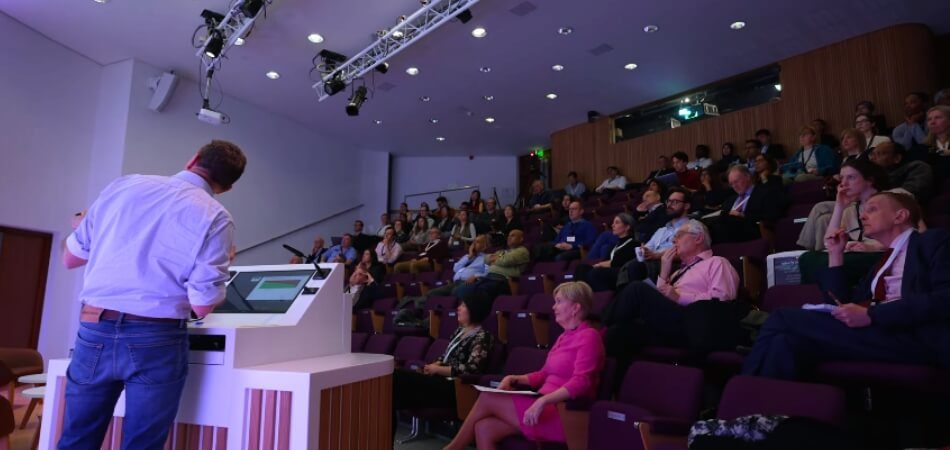Medical conferences can be overwhelming, especially when there are so many sessions, workshops, and research presentations. Amidst this ocean of knowledge, a frequently asked question emerges, “what to do at a medical conference?”
Beyond the academic pursuits, a key aspect is to seize networking opportunities. Engaging with like-minded individuals not only broadens one’s professional circle but also provides unique insights into the healthcare world.
From casual chats during coffee breaks to dedicated networking sessions, every interaction holds potential. So, as you prepare your conference itinerary, prioritize meeting new healthcare professionals. Embrace the social events and make the most of every opportunity to grow both personally and professionally.
What Happens at a Medical Conference?
Medical conferences serve as vital platforms for healthcare professionals across the globe. They unite experts, researchers, and practitioners under one roof, fostering collaboration and growth. These gatherings play multiple roles, essential for the evolution of the medical field.

- The Conference on Nursing and Healthcare Management showcases the latest research, offering attendees insights into recent advancements and breakthroughs.
- Professional development is another core aspect, with numerous sessions geared toward skill enhancement and training.
- Collaboration opportunities abound, enabling physicians and researchers to discuss and potentially combine efforts.
- Attendees benefit from exposure to diverse viewpoints, enriching their understanding of global health challenges.
- Beyond academia, these conferences provide networking avenues, critical for career growth and forming valuable partnerships.
What to Do at a Medical Conference?
Attending a medical conference can be an enriching experience, offering a myriad of opportunities for learning, networking, and personal growth. Here’s a guide on what to do at a medical conference:
Planning and Preparation
Before setting foot at the venue, familiarize yourself with the conference agenda. Identify the sessions, workshops, or keynote speakers that pique your interest. Register for any specialized sessions in advance, and arrange your itinerary to maximize your participation.
Keynote Sessions: The Heartbeat of Conferences
Keynote speakers, often luminaries in their fields, offer unique insights into the future of medicine and prevailing trends. These sessions set the mood for the conference, providing overarching themes and sparking discussions.
Workshops: Where Theory Meets Practice
Workshops provide hands-on experiences, allowing attendees to gain practical skills. Whether it’s a new surgical technique, a software tool, or patient communication strategies, these sessions are invaluable for skills enhancement.
Networking: Building Bridges in the Medical Community
Conferences are melting pots of talent. Engage in meaningful conversations, attend networking events, and consider even informal chats during breaks as opportunities to expand your professional network.
Exhibitor Booths: a Glimpse into the Future
The exhibit hall isn’t just about freebies. Companies present their latest innovations, from cutting-edge medical devices to novel pharmaceuticals. Interact, ask questions, and understand what’s on the horizon for healthcare.
Breakout Sessions: Deep Dives into Specialized Topics
These smaller group sessions allow for an intimate exploration of niche topics. They often feature panel discussions, case studies, and interactive debates, enabling attendees to gain in-depth knowledge.
Note-Taking: The Backbone of Retention
Documenting key takeaways ensures that the knowledge gained doesn’t evaporate after the conference ends. Use digital tools, traditional notebooks, or even voice memos to capture salient points.
Social Engagements: Informal Learning and Bonding
Dinners, mixers, or cocktail hours serve dual purposes. While they offer relaxation after intense learning, they are also platforms for serendipitous meetings and forming lasting connections.
Active Participation: The Power of Queries
Engage proactively. Pose questions during Q&A sessions, participate in polls, or even share your experiences when relevant. This not only clarifies your doubts but enriches the discussion for all.
Staying Connected: Digital Companions for Conferences
Many conferences have bespoke apps, social media groups, or hashtags. Engage in these digital platforms for real-time updates, connecting with peers, and sharing your experiences.
Post-Conference Reflections and Implementation
Once the hustle and bustle wane, spend time reflecting on the knowledge imbibed. Strategize on how to integrate newfound skills or insights into your daily practice.
Fostering Continued Connections

Remember, while the sessions and workshops are crucial, the informal interactions during coffee breaks, lunches, and social events can be equally beneficial. Strike a balance, and make the most of every moment.
Different Types of Medical Conferences
Medical conferences vary in scope, focus, and audience. These events, tailored to specific needs and disciplines, play a pivotal role in the advancement of healthcare. Here’s a snapshot of the diverse types of medical conferences.
Clinical Conferences
Highlighting patient care and clinical practices, these events prioritize hands-on workshops, case studies, and practical insights. Professionals gather to exchange techniques, ensuring optimal patient outcomes.
Research Symposia
Researchers convene at these platforms to discuss and present their findings. These gatherings drive medical innovation, showcasing the latest advancements in myriad fields.
Educational Forums
Focused on medical education and training, these conferences cater primarily to teachers, students, and academic professionals. They emphasize curriculum development, teaching methodologies, and emerging educational tools.
Technology and Innovation Conventions
As technology revolutionizes healthcare, these conferences spotlight cutting-edge tools, software, and devices. Attendees learn about digital health, telemedicine, and state-of-the-art equipment.
Public Health Summits
These events delve into broader health challenges, policies, and global health concerns. Professionals from various disciplines collaborate, aiming for better community health outcomes.
Specialty-Specific Conferences
Tailored to specific branches of medicine, like cardiology or neurology, these events delve deeply into their respective fields. Experts discuss niche topics, advancements, and best practices.
Who Attends the Medical Conference?
Medical conferences magnetize a diverse array of professionals, all united by a passion for healthcare and medicine. Each attendee, whether a seasoned veteran or a budding enthusiast, seeks knowledge, growth, and collaboration. Let’s explore the spectrum of individuals these events attract.
Physicians and Surgeons
Renowned experts and young practitioners alike converge at these gatherings. They share experiences, learn about advancements, and foster interdisciplinary collaboration.
Medical Researchers
Driven by curiosity, these individuals present findings and absorb new knowledge. Conferences offer them a platform to validate, share, and challenge their discoveries.
Nurses and Allied Health Professionals
Critical pillars of healthcare, they attend to hone skills and stay updated. Conferences provide them resources, techniques, and network expansion opportunities.
Medical Students
Eager to absorb knowledge and identify career paths, students find value in attending. They gain insights, network, and understand emerging medical landscapes.
Pharmaceutical Professionals
From showcasing drugs to learning about clinical trials, they represent the pharma sector. Conferences grant them insights into medical needs and market trends.
Medical Device Representatives
Introducing groundbreaking devices and technologies plays a pivotal role. They engage with clinicians, understand requirements, and exhibit product innovations.
Healthcare Administrators
Behind-the-scenes stalwarts of any healthcare system, discuss management and operational strategies. These events equip them with tools for improved healthcare delivery.
The tapestry of attendees at a medical conference is rich and varied, encapsulating the vast universe of healthcare. These gatherings symbolize collective wisdom, collaborative spirit, and a shared mission for better health outcomes.
How to Choose the Right Medical Conference?
Selecting the ideal medical conference can influence one’s professional journey significantly. With countless events around the world, the right choice maximizes learning and networking. Here are tips to guide your selection:
- Define Your Objectives: Understand what you seek, be it research, clinical skills, or networking. Tailor your choice to these professional needs and aspirations.
- Review the Agenda: Study the conference program in detail. Ensure it offers sessions, workshops, or speakers aligned with your interests.
- Consider Logistics: Evaluate the venue’s location, potential travel costs, and dates. Opt for conferences that fit comfortably within your budget and schedule.
- Check the Speakers: Notable speakers often indicate a conference’s quality. Prioritize events featuring industry leaders or pioneers in your field.
- Seek Feedback: Connect with past attendees for reviews. Their insights can give a clearer picture of the conference’s value and ambiance.
- Assess Networking Opportunities: Some conferences excel in facilitating interactions. If networking is key, choose events that host mixers, breakout sessions, or discussion forums.
- Verify Accreditation: For continuing medical education (CME) points, ensure relevant authorities accredit the conference. This guarantees recognized professional development.
- Analyze Size and Scale: While large conferences offer diverse sessions, smaller ones might provide intimate networking. Choose based on your preference for scale and engagement.
Wrap Up
Medical conferences stand as essential beacons of knowledge, fostering collaboration and promoting innovative advancements in healthcare. They unite a vast spectrum of professionals, each seeking to enrich their expertise and expand their networks.
Amidst this vibrant ecosystem, many often wonder, “What to do at a medical conference?” The answer goes beyond mere academic indulgence. It’s about understanding one’s objectives, networking with fervor, diving deep into research findings, embracing new techniques, and, most importantly, personal and professional growth.
As the medical realm continues to evolve at a rapid pace, it’s pivotal for attendees to extract the maximum value from these events, ensuring they remain at the forefront of medical progress and excellence.






